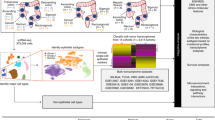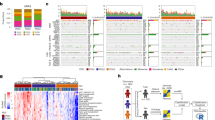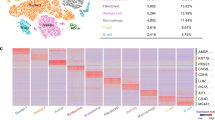Abstract
Although surgery remains the mainstay of curative treatment for colorectal cancer (CRC), many patients still have high chance to experience disease relapse. It is therefore imperative to identify prognostic markers that can help predict the clinical outcomes of CRC. Aberrant microRNA expression holds great potential as diagnostic and prognostic biomarker for CRC. Here we aimed to investigate clinical potential of miR-34a-5p as a prognostic marker for CRC recurrence and its functional significance. First, we validated that miR-34a-5p was downregulated in CRC tumour tissues (P<0.05). The expression level of tissue miR-34a-5p was then evaluated in two independent cohorts of 268 CRC patients. miR-34a-5p expression was positively correlated with disease-free survival in two independent cohorts (cohort I: n=205, P<0.001; cohort II: n=63, P=0.006). Moreover, the expression of miR-34a-5p was an independent prognostic factor for CRC recurrence by multivariate analysis (P<0.001 for cohort I, P=0.007 for cohort II). Ectopic expression of miR-34a-5p in p53 wild-type colon cancer cell HCT116 significantly inhibited cell growth, migration, invasion and metastasis. miR-34a-5p induced cell apoptosis, cell cycle arrest at G1 phase and p53 transcription activity in HCT116 cells, but not in the HCT116 p53 knockout (p53−/−) cells. miR-34a-5p significantly suppressed the HCT116 growth in vivo, whereas it showed no effect on the HCT116 p53−/− xenograft, indicating that the growth-inhibiting effect by miR-34a-5p was dependent on p53. In addition, the expression level of miR-34a-5p in patients with p53-positive expression was higher than that in patients with p53-negative expression (P<0.01). In conclusion, miR-34a-5p inhibits recurrence of CRC through inhibiting cell growth, migration and invasion, inducing cell apoptosis and cell cycle arrest in a p53-dependent manner.
This is a preview of subscription content, access via your institution
Access options
Subscribe to this journal
Receive 50 print issues and online access
$259.00 per year
only $5.18 per issue
Buy this article
- Purchase on Springer Link
- Instant access to full article PDF
Prices may be subject to local taxes which are calculated during checkout






Similar content being viewed by others
References
Jemal A, Bray F, Center MM, Ferlay J, Ward E, Forman D . Global cancer statistics. CA Cancer J Clin 2011; 61: 69–90.
Mirakhorli M, Rahman SA, Abdullah S, Vakili M, Rozafzon R, Khoshzaban A . Multidrug resistance protein 2 genetic polymorphism and colorectal cancer recurrence in patients receiving adjuvant FOLFOX-4 chemotherapy. Mol Med Rep 2013; 7: 613–617.
Baranwal S, Alahari SK . miRNA control of tumor cell invasion and metastasis. Int J Cancer 2010; 126: 1283–1290.
Wang Z, Li Y, Kong D, Ahmad A, Banerjee S, Sarkar FH . Cross-talk between miRNA and Notch signaling pathways in tumor development and progression. Cancer Lett 2010; 292: 141–148.
Ma Y, Li W, Wang H . Roles of miRNA in the initiation and development of colorectal carcinoma. Curr Pharm Des 2013; 19: 1253–1261.
Dong Y, Wu WKK, Wu CW, Sung JJY, Yu J, Ng SSM . MicroRNA dysregulation in colorectal cancer: a clinical perspective. Br J Cancer 2011; 104: 893–898.
Ng EKO, Chong WWS, Jin H, Lam EKY, Shin VY, Yu J et al. Differential expression of microRNAs in plasma of patients with colorectal cancer: a potential marker for colorectal cancer screening. Gut 2009; 58: 1375–1381.
Wu CW, Ng SSM, Dong YJ, Ng SC, Leung WW, Lee CW et al. Detection of miR-92a and miR-21 in stool samples as potential screening biomarkers for colorectal cancer and polyps. Gut 2012; 61: 739–745.
Wu CW, Ng SC, Dong Y, Tian L, Ng SSM, Leung WW et al. Identification of microRNA-135b in Stool as a Potential Noninvasive Biomarker for Colorectal Cancer and Adenoma. Clin Cancer Res 2014; 20: 2994–3002.
Zhang X, Yan Z, Zhang J, Gong L, Li W, Cui J et al. Combination of hsa-miR-375 and hsa-miR-142-5p as a predictor for recurrence risk in gastric cancer patients following surgical resection. Ann Oncol 2011; 22: 2257–2266.
Yang M, Shen H, Qiu C, Ni Y, Wang L, Dong W et al. High expression of miR-21 and miR-155 predicts recurrence and unfavourable survival in non-small cell lung cancer. Eur J Cancer 2013; 49: 604–615.
Zhu HT, Dong QZ, Sheng YY, Wei JW, Wang G, Zhou HJ et al. MicroRNA-29a-5p is a novel predictor for early recurrence of hepatitis B virus-related hepatocellular carcinoma after surgical resection. PLoS One 2012; 7: e52393.
Hermeking H . p53 enters the microRNA world. Cancer Cell 2007; 12: 414–418.
Yamakuchi M, Lowenstein CJ . MiR-34, SIRT1 and p53: the feedback loop. Cell Cycle 2009; 8: 712–715.
Wu J, Wu G, Lv L, Ren Y-F, Zhang X-J, Xue Y-F et al. MicroRNA-34a inhibits migration and invasion of colon cancer cells via targeting to Fra-1. Carcinogenesis 2012; 33: 519–528.
Ji Q, Hao X, Meng Y, Zhang M, Desano J, Fan D et al. Restoration of tumor suppressor miR-34 inhibits human p53-mutant gastric cancer tumorspheres. BMC Cancer 2008; 8: 266.
Li N, Fu H, Tie Y, Hu Z, Kong W, Wu Y et al. miR-34a inhibits migration and invasion by down-regulation of c-Met expression in human hepatocellular carcinoma cells. Cancer Lett 2009; 275: 44–53.
Gallardo E, Navarro A, Viñolas N, Marrades RM, Diaz T, Gel B et al. miR-34a as a prognostic marker of relapse in surgically resected non-small-cell lung cancer. Carcinogenesis 2009; 30: 1903–1909.
Yamakuchi M, Ferlito M, Lowenstein CJ . miR-34a repression of SIRT1 regulates apoptosis. Proc Natl Acad Sci USA 2008; 105: 13421–13426.
Li L, Yuan L, Luo J, Gao J, Guo J, Xie X . MiR-34a inhibits proliferation and migration of breast cancer through down-regulation of Bcl-2 and SIRT1. Clin Exp Med 2013; 13: 109–117.
Yamamura S, Saini S, Majid S, Hirata H, Ueno K, Deng G et al. MicroRNA-34a modulates c-Myc transcriptional complexes to suppress malignancy in human prostate cancer cells. PLoS One 2012; 7: e29722.
Bu P, Chen KY, Chen JH, Wang L, Walters J, Shin YJ et al. A microRNA miR-34a-regulated bimodal switch targets Notch in colon cancer stem cells. Cell Stem Cell 2013; 12: 602–615.
Chang TC, Wentzel EA, Kent OA, Ramachandran K, Mullendore M, Lee KH et al. Transactivation of miR-34a by p53 broadly influences gene expression and promotes apoptosis. Mol Cell 2007; 26: 745–752.
Leng Z, Tao K, Xia Q, Tan J, Yue Z, Chen J et al. Krüppel-like factor 4 acts as an oncogene in colon cancer stem cell-enriched spheroid cells. PLoS One 2013; 8: e56082.
Chen Q, Li L, Tu Y, Zheng LL, Liu W, Zuo XY et al. MiR-34a regulates apoptosis in liver cells by targeting the KLF4 gene. Cell Mol Biol Lett 2014; 19: 52–64.
Nair VS, Maeda LS, Ioannidis JPA . Clinical outcome prediction by microRNAs in human cancer: a systematic review. J Natl Cancer Inst 2012; 104: 528–540.
Christensen LL, Tobiasen H, Holm A, Schepeler T, Ostenfeld MS, Thorsen K et al. MiRNA-362-3p induces cell cycle arrest through targeting of E2F1, USF2 and PTPN1 and is associated with recurrence of colorectal cancer. Int J Cancer 2013; 133: 67–78.
Yang IP, Tsai HL, Hou MF, Chen KC, Tsai PC, Huang SW et al. MicroRNA-93 inhibits tumor growth and early relapse of human colorectal cancer by affecting genes involved in the cell cycle. Carcinogenesis 2012; 33: 1522–1530.
Kjaer-Frifeldt S, Hansen TF, Nielsen BS, Joergensen S, Lindebjerg J, Soerensen FB et al. The prognostic importance of miR-21 in stage II colon cancer: a population-based study. Br J Cancer 2012; 107: 1169–1174.
Mandke P, Wyatt N, Fraser J, Bates B, Berberich SJ, Markey MP . MicroRNA-34a modulates MDM4 expression via a target site in the open reading frame. PLoS One 2012; 7: e42034.
Li L, Wang L, Li L, Wang Z, Ho Y, McDonald T et al. Activation of p53 by SIRT1 inhibition enhances elimination of CML leukemia stem cells in combination with imatinib. Cancer Cell 2012; 21: 266–281.
Li M, Luo J, Brooks CL, Gu W . Acetylation of p53 inhibits its ubiquitination by Mdm2. J Biol Chem 2002; 277: 50607–50611.
Sun Y, Wenger L, Rutter JL, Brinckerhoff CE, Cheung HS . p53 down-regulates human matrix metalloproteinase-1 (collagenase-1) gene expression. J Biol Chem 1999; 274: 11535–11540.
Tokino T, Nakamura Y . The role of p53-target genes in human cancer. Crit Rev Oncol Hematol 2000; 33: 1–6.
Mitrea DM, Yoon M-K, Ou L, Kriwacki RW . Disorder-function relationships for the cell cycle regulatory proteins p21 and p27. Biol Chem 2012; 393: 259–274.
Tobiume K . Involvement of Bcl-2 family proteins in p53-induced apoptosis. J Nippon Med Sch 2005; 72: 192–193.
Dong Y, Zhao J, Wu CW, Zhang L, Liu X, Kang W et al. Tumor suppressor functions of miR-133a in colorectal cancer. Mol Cancer Res 2013; 11: 1051–1060.
Acknowledgements
This work was supported by National Natural Science Foundation of China (No. 81301853, 81072034), National High Technology Research and Development Program (No. 2012AA 02A 504, 2012AA 02A 506), Shenzhen Technology and Innovation Project Fund, Shenzhen (JSGG20130412171021059), China 863 program (2012AA02A506), Shenzhen Municipal Science and Technology R & D fund (JCYJ20120619152326450) and Shenzhen Virtual University Park Support Scheme to CUHK Shenzhen Research Institute.
Author information
Authors and Affiliations
Corresponding authors
Ethics declarations
Competing interests
The authors declare no conflict of interest.
Additional information
Supplementary Information accompanies this paper on the Oncogene website
Rights and permissions
About this article
Cite this article
Gao, J., Li, N., Dong, Y. et al. miR-34a-5p suppresses colorectal cancer metastasis and predicts recurrence in patients with stage II/III colorectal cancer. Oncogene 34, 4142–4152 (2015). https://doi.org/10.1038/onc.2014.348
Received:
Revised:
Accepted:
Published:
Issue Date:
DOI: https://doi.org/10.1038/onc.2014.348
This article is cited by
-
A miR-34a-guided, tRNAiMet-derived, piR_019752-like fragment (tRiMetF31) suppresses migration and angiogenesis of breast cancer cells via targeting PFKFB3
Cell Death Discovery (2022)
-
MKL-1-induced PINK1-AS overexpression contributes to the malignant progression of hepatocellular carcinoma via ALDOA-mediated glycolysis
Scientific Reports (2022)
-
AM22, a novel synthetic microRNA, inhibits the proliferation of colorectal cancer cells by targeting core binding factor subunit β (CBFB)
Investigational New Drugs (2022)
-
Mesenchymal Stem Cell-derived Extracellular Vesicles Transmitting MicroRNA-34a-5p Suppress Tumorigenesis of Colorectal Cancer Through c-MYC/DNMT3a/PTEN Axis
Molecular Neurobiology (2022)
-
KCNQ1OT1 affects cell proliferation, invasion, and migration through a miR-34a / Notch3 axis in breast cancer
Environmental Science and Pollution Research (2022)



